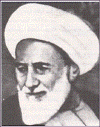KEBENARAN HANYA DARI TUHAN(1)
26/04/2006
Allah berfirman dalam al Qur’an yang maksudnya :
" Kebenaran itu datang dari Tuhanmu dan janganlah kamu menentangnya."
Kebenaran atau yang hak itu berasal dari satu sumber saja iaitu dari Tuhan. Ertinya akidah yg hak adalah akidah yang datang dari Tuhan. Pertolongan hidup yang benar itu datang dari Tuhan. Setiap yang benar itu hanya datang dari Tuhan. Akhlak yang benar itu datang dari Tuhan, pendidikan yang benar itu pendidikan yang datang dari Tuhan. Sistem ekonomi yang benar itu sistem ekonomi yang datang dari Tuhan. Sistem politik yang benar itu sistem politik yang datang dari Tuhan. Sistem masyarakat yang benar itu adalah yang datang dari Tuhan. Jemaah yang benar itu jemaah dari Tuhan. Pemimpin yang benar itu pemimpin yang ditunjuk oleh Tuhan. Ilmu yang benar itu adalah ilmu yang datang dari Tuhan. Perjuangan yang benar itu adalah perjuangan yang datang dari Tuhan. Begitulah seterusnya
Kalau kebenaran itu bukan datang dari Tuhan, ia bukanlah kebenaran. Kalaupun benar, ia merupakan kebetulan saja, sebab bukan datang dari Tuhan. Memang ada setengah-setengah ajaran benar, tapi kerena tidak datang dari Tuhan, maka itu suatu kebetulan sahaja. Misalnya semua orang tidak suka mencuri, tapi tidak dikaitkan dengan Tuhan, maka itu bukan kebenaran, hanya fitrah saja.
Kebenaran itu datang dari Tuhan, diamalkan kerena Tuhan dan dengan menggunakan panduan yang datang dari Tuhan. Itulah huraian ayat tadi. Kebenaran yang hak, lawannya kebatilan. Di dunia ini biasanya kebatilan itu lebih banyak dan berlakunya lebih lama. Sedangkan kebenaran datang sekali sekala sahaja.
Oleh kerana kebatilan itu selalunya merusakkan manusia, maka ianya tidak disukai oleh orang, samada ia baik ataupun jahat. Bila gejala masyarakat sudah membiak dan menyusahkan masyarakat, bukan hanya orang baik yang cakap, tetapi orang jahat juga cakap, sebab kebatilan itu menyusahan semua orang. Jangan anggap orang yang tak suka gejala ini hanya orang baik sahaja. Kalau kerana kebatilan yang berlaku dalam masyarakat itu Tuhan akan turunkan hukuman, maka Tuhan tak pilih, orang jahat atau orang baik terkena juga.
Manusia tidak mahu kebatilan, tetapi mereka tidak tahu macam mana melahirkan yang hak.
Ayat yang ke-2 bermaksud, Katakanlah :
“Telah datang yang haq (kebenaran) dan telah lenyap yang batil atau yang palsu. Sesungguhnya yang batil itu pasti lenyap”.
Bagaimana huraian ayat ini? Ayat ini mengatakan bahawa bila datang yang hak atau yang benar, otomatik yang batil hilang. Macam bila datang malam, maka otomatik siang lenyap dan bila datang siang, maka hilanglah malam.
Bagaimana huraian bila datang yang hak, otomatik yang batil hilang? Untuk memahami siang dan malam mudah, sebab Tuhan yang buat. Sedangkan yang jahat dan yang hak manusia yang buat. Kalau berlaku yang hak, orang yang batil dan jahat mendapat nikmat sama, begitu juga bila lahir yang batil, orang yang baik dan jahat susah sama.
Bila malam datang, semua orang terlibat dengan malam, samada dia suka atau. Begitu juga bila datang siang, semua orang kena menerimanya, tak boleh tolak. Begitulah, bila yang hak datang semua suka, samada dia jahat ataupun baik. Bila yang batil datang, bukan hanya orang jahat yang susah, tapi orang baik juga susah. Sebab itu semua manusia samada baik atau jahat menunggu kebenaran, cuma mereka tidak faham bagaimana mewujudkannya.

